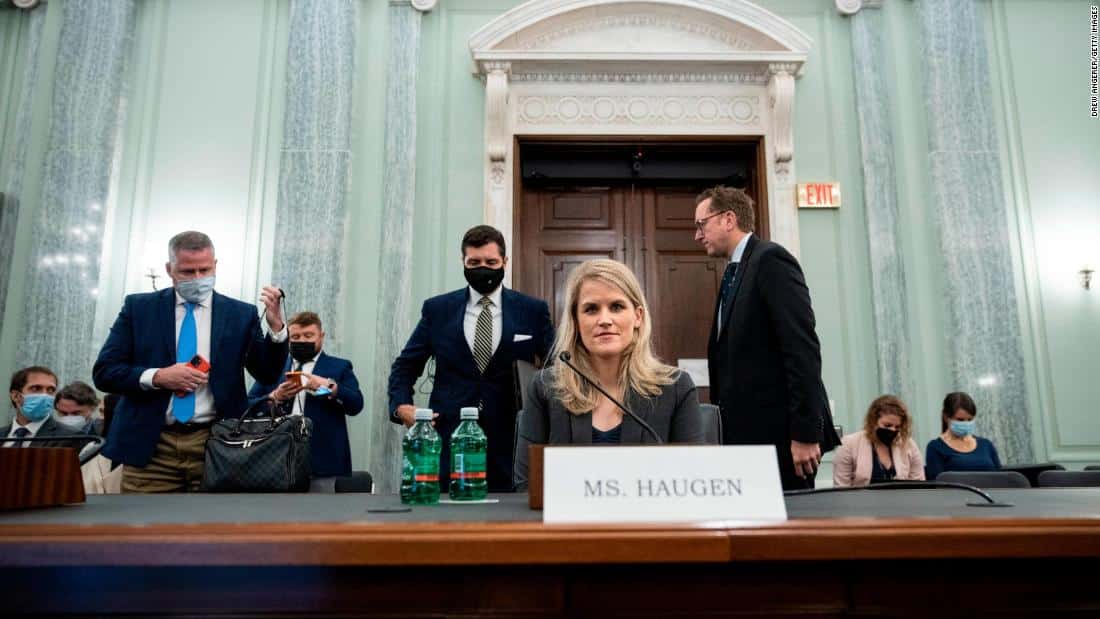Much is revealed by who is bestowed hero status by the corporate media. This week’s anointed avatar of stunning courage is Frances Haugen, a former Facebook product manager being widely hailed as a “whistleblower” for providing internal corporate documents to the Wall Street Journal relating to the various harms which Facebook and its other platforms (Instagram and WhatsApp) are allegedly causing.
The social media giant hurts America and the world, this narrative maintains, by permitting misinformation to spread (presumably more so than cable outlets and mainstream newspapers do virtually every week); fostering body image neurosis in young girls through Instagram (presumably more so than fashion magazines, Hollywood and the music industry do with their glorification of young and perfectly-sculpted bodies); promoting polarizing political content in order to keep the citizenry enraged, balkanized and resentful and therefore more eager to stay engaged (presumably in contrast to corporate media outlets, which would never do such a thing); and, worst of all, by failing to sufficiently censor political content that contradicts liberal orthodoxies and diverges from decreed liberal Truth. On Tuesday, Haugen’s star turn took her to Washington, where she spent the day testifying before the Senate about Facebook’s dangerous refusal to censor even more content and ban even more users than they already do.
There is no doubt, at least to me, that Facebook and Google are both grave menaces. Through consolidation, mergers and purchases of any potential competitors, their power far exceeds what is compatible with a healthy democracy. A bipartisan consensus has emerged on the House Antitrust Committee that these two corporate giants — along with Amazon and Apple — are all classic monopolies in violation of long-standing but rarely enforced antitrust laws. Their control over multiple huge platforms that they purchased enables them to punish and even destroy competitors, as we saw when Apple, Google and Amazon united to remove Parler from the internet forty-eight hours after leading Democrats demanded that action, right as Parler became the most-downloaded app in the country, or as Google suppresses Rumble videos in its dominant search feature as punishment for competing with Google’s YouTube platform. Facebook and Twitter both suppressed reporting on the authentic documents about Joe Biden’s business activities reported by The New York Post just weeks before the 2020 election. These social media giants also united to effectively remove the sitting elected President of the United States from the internet, prompting grave warnings from leaders across the democratic world about how anti-democratic their consolidated censorship power has become.
But none of the swooning over this new Facebook heroine nor any of the other media assaults on Facebook have anything remotely to do with a concern over those genuine dangers. Congress has taken no steps to curb the influence of these Silicon Valley giants because Facebook and Google drown the establishment wings of both parties with enormous amounts of cash and pay well-connected lobbyists who are friends and former colleagues of key lawmakers to use their D.C. influence to block reform. With the exception of a few stalwarts, neither party’s ruling wing really has any objection to this monopolistic power as long as it is exercised to advance their own interests.
And that is Facebook’s only real political problem: not that they are too powerful but that they are not using that power to censor enough content from the internet that offends the sensibilities and beliefs of Democratic Party leaders and their liberal followers, who now control the White House, the entire executive branch and both houses of Congress. Haugen herself, now guided by long-time Obama operative Bill Burton, has made explicitly clear that her grievance with her former employer is its refusal to censor more of what she regards as “hate, violence and misinformation.” In a 60 Minutes interview on Sunday night, Haugen summarized her complaint about CEO Mark Zuckerberg this way: he “has allowed choices to be made where the side effects of those choices are that hateful and polarizing content gets more distribution and more reach.” Haugen, gushed The New York Times’ censorship-desperate tech unit as she testified on Tuesday, is “calling for regulation of the technology and business model that amplifies hate and she’s not shy about comparing Facebook to tobacco.”
Agitating for more online censorship has been a leading priority for the Democratic Party ever since they blamed social media platforms (along with WikiLeaks, Russia, Jill Stein, James Comey, The New York Times, and Bernie Bros) for the 2016 defeat of the rightful heir to the White House throne, Hillary Clinton. And this craving for censorship has been elevated into an even more urgent priority for their corporate media allies, due to the same belief that Facebook helped elect Trump but also because free speech on social media prevents them from maintaining a stranglehold on the flow of information by allowing ordinary, uncredentialed serfs to challenge, question and dispute their decrees or build a large audience that they cannot control. Destroying alternatives to their failing platforms is thus a means of self-preservation: realizing that they cannot convince audiences to trust their work or pay attention to it, they seek instead to create captive audiences by destroying or at least controlling any competitors to their pieties.
Fair use except. Read the whole article here.



